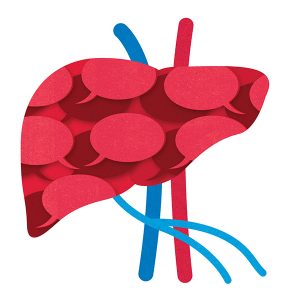
For World Hepatitis Day (28 July), Dr Philippa Pristerà shares an open letter to the people that she met and interviewed early last year as part of her research study exploring the experiences of people living with and accessing care for Hepatitis C, and their perspectives on cure.
Dear all,
I am writing to you because you took part in my interview-based study ‘Viewpoints from hepatitis C: accessing and experiencing cure’*. Some of you I met about a month before I gave birth to my daughter, others would have met my colleague Jane Bruton who kindly took over while I was on maternity leave. Since my return to work, I have spent my time reading over the interviews to see what key themes came through and would like to take this opportunity to update you.
I want to say thank you
Thank you for sharing your story; for sitting down with a complete stranger, a heavily pregnant one, to be interviewed about your life. To help me build the context around your experiences and better understand your story, you revealed a great deal about your expectations and your beliefs, your current and past behaviour and their consequences. I was struck by your openness, and so grateful for your trust.
Here’s what you said about cure
One question I asked was “What does the word cure mean to you”; a question that highlights your motivations for treatment and your expectations of the future. A number of you who had once injected drugs described cure of hepatitis C as a fitting “closure on that chapter” of your life. You shared how optimistic you were about the future, and how grateful you were for the care and support of the healthcare providers at St Mary’s. But you also raised one interesting and important point: “Cure is a dangerous word for an addict”.
I know a number of you had tried to clear the virus in the past using earlier types of hepatitis C medication and how the knock-back that followed when that failed had been terrible. You shared stories of returning to drugs and believing you would never get cleared of the virus. You highlighted how ‘hope’ is one thing many addicts struggle with, so I can see how a word such as ‘cure’ may sound like a dangerous promise. Improved access to new direct-acting antivirals over the past few years has revolutionised treatment for hepatitis C in England, with latest figures suggesting cure (or viral clearance) can now be achieved in at least 95% of people treated, but it’s still not guaranteed. And what is going to be ‘cured’ is also open to interpretation, considering there are often no visible symptoms. Beyond clearing the hepatitis C virus, there’s an awareness of continuing risks and consequences that may also concern you.
Hepatitis C doesn’t just affect people who inject drugs. A blood transfusion given in the years before screening began, a tattoo abroad, sexual contacts – these are three of the less well-known routes of hepatitis C transmission that came up in interview. You all described the relief that ‘cure’ or clearance of the virus would bring. Even if it hadn’t had a huge impact on your lives, you shared how hepatitis C was always in the back of your mind, making you particularly conscious about possible onward transmission. The silence of the disease made it easier to forget the health risks at first. But as you got older and faced other health concerns, the ‘ticking time bomb in [your] liver’, as one of you described it, weighed more heavily on your mind, leading you to hope curative treatment would be developed, before it was too late.

Finally, some of you were also living with other chronic conditions, such as HIV. In this context, you saw treatment as eliminating one of the viruses and removing the additional health risks that come from living with both conditions. Some of you had been diagnosed in the past few years so were fortunate not to have to wait too long for treatment. However, I sensed a greater urgency for treatment among you compared with those who were not also living with HIV. The accelerated harm that living with HIV and hepatitis C is believed to cause was a huge motivator, but also a key factor underlying the stigma that you confirmed still exists towards hepatitis C within the HIV community.
Many of you had been surprised by your hepatitis C diagnosis and talked about the lack of relevant information that was available to you on risks and routes of transmission, particularly for gay and bisexual men. Cure was also seen as less definite by some, either due to past treatment failure or because of the risk of acquiring hepatitis C again. As one of you said, “it’s almost impossible [to monitor]… if someone says they’re Hep C negative, unless they haven’t had sex since they were tested, they can’t say for sure.”
Here’s what I plan to do next

So much can be gleaned from the 12 hours’ worth of interviews that I collected. You shared your experiences and expectations of hepatitis C and cure, but you also told me things I wasn’t expecting to hear; like the fact “no-one wants to have safe sex anymore”, or that “people don’t really know or care” what hepatitis C is, or the barriers caused by lack of awareness, lack of disclosure and lack of proactive hepatitis C testing. It’s not always possible for all elements of research to lead to change. However, now that you’ve told me, here’s what I’m going to do:
- I will present some of the beliefs and barriers shared by those of you living with hepatitis C and HIV at the AIDS IMPACT 2019 Conference in London
- I plan to write a paper on the concept of cure for hepatitis C, which I hope to publish in a peer-reviewed journal – I will share the link to this if successful (fingers-crossed!)
- I will let the staff at St Mary’s Hospital know how grateful you were for their patience, their knowledge, the quality of their care, for not being judgemental and most importantly for their support. And in terms of improvements, there were only a few but I will pass them on too
- I will try to raise awareness of hepatitis C with the people I meet and break down any remaining stigma
- And I will do all I can to make sure the other experiences you shared, barriers you raised and improvements you suggested will continue to be remembered and reflected upon
I hope this letter has given you some insight into where I am with the study and how I plan to share your stories. I also hope treatment has gone well for you all and wish you all the very best for the future.
If you would like to reply to this letter with any questions or comments, please drop me an email.
Warm regards,
Philippa Pristerà (née Moss)
Dr Philippa Pristerà (@PPristera) is a research associate at the Patient Experience Research Centre (PERC), School of Public Health. She also facilitates and supports public involvement in research at Imperial through PERC and the use of VOICE – a digital platform for public involvement established by Newcastle University with whom Imperial are now a partner.
If you would like to participate in research, engage with our researchers or be more involved in shaping what we do to improve patient experience and care, please get in touch to find out what opportunities are currently available. Email: patientexperience@imperial.ac.uk; Call: +44 (0) 207 594 3417.
Letter notes: